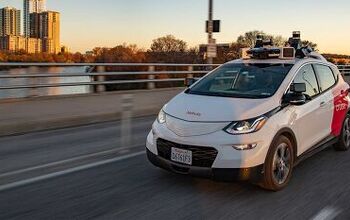Bark's Bites: You've Got a Target on Your Back, Mr. Car Shopper

It’s happened to all of us, right? You’re reading a review on a website like TheTruthAboutCars.com, and then you decide to go browsing for some cars online at a dealer’s website, perhaps casually looking for a weekend toy or a new family hauler. Since you’re like most car shoppers, 95 percent of whom don’t take action the first time they visit a car dealer’s website, you leave the site and go about your day on the internet.
But when you go to ESPN.com to check the latest World Cup results (Viva Colombia!), there’s an ad for that same car you were just looking at. Whoa, that’s a little creepy, right? And then, the next day, you get an email from another dealership — you never even went to that website! How did they get your information?
Car dealers are getting more sophisticated than ever when trying to get your attention online. Luckily, your old friend Bark is here to tell you how they do it.
Retargeting is one of the oldest tricks in the digital book, and the one you’re most familiar with. Site retargeting occurs when you visit a dealer’s website and then leave to go elsewhere on the web. Every time a new visitor goes to that site, the code on the site places an anonymous cookie on his or her browser. Later, when those cookied visitors browse the Web, the cookie will let the dealer’s retargeting provider know when to serve ads, ensuring that the dealer’s ads are served to only to people who have previously visited the dealer’s website.
Search retargeting is a little bit different. You don’t have to have visited the dealer’s website in order to be hit with a retargeting ad — they can serve you an ad based on your search history (which your favorite search engine is only too happy to sell). By using site retargeting, a dealer can reach out to consumers who have already visited their website. In contrast, a shopper who is targeted by search retargeting probably hasn’t visited the dealers’s website previously. By using this form of retargeting, the dealer can attract consumers who have conducted online searches that are relevant to the cars they offer. If you’re a Chevy dealer, you can serve Equinox ads to customers who are searching for “small SUV under 30,000,” even if they’ve never actually visited your site, or even searched for an Equinox.
But we can get even creepier. Contextual retargeting helps a dealer serve you an ad for something that you’ve never even searched for. So let’s say that you’re reading a review of that Equinox on TheTruthAboutCars.com, but you never searched for an Equinox, or even a small SUV — you just visit TTAC everyday and read the fine reviews posted there. The dealer’s retargeting vendor scans the text of the sites you read, and serves you ads based on that text. This form of advertising is surprisingly effective — it seems a lot less invasive than traditional site retargeting, because it’s serving you ads for things you might not even know you’re interested in.
That’s not all, though. Dealers can serve you an ad based on your demographics — you may have never even shown the slightest bit of interest in buying a car online, but all of a sudden you’re seeing more Equinox ads when you’re browsing the net. That’s because we know that you’re pregnant — maybe even before your friends and family do. Go here to see what the internet knows about you (works best from desktop). It’s not always right — the internet sometimes thinks I’m 21-24 and I live in an apartment— but your activity online is always being tracked and measured, helping advertisers build a profile for you and placing you in a segment, based on your age, income, family status, where you live — all of it.
Wanna get creepier? Sure, let’s do it. Advertisers can build a profile specifically for you. Legally, they can’t know your actual name (that has to be randomized), but they can build a profile based on your browser — and if you use Google or Facebook, it can even go across devices. Data agencies collect billions of pieces of unstructured data every minute, and they sell your profile to the highest bidder.
And if you use social media, dealers can serve ads to you based on your being a “lookalike.” Facebook places a pixel on dealer websites, collecting your social media information when you visit. A Facebook pixel is code that helps track conversions from Facebook ads, optimize ads based on collected data, and build targeted audiences for future ads — all without you even knowing it’s happening. If your social media profile looks enough like the social media profile of other car shoppers, you’ll be served car ads on social all day long.
The ads themselves are getting better, too. No longer will clicking on an ad simply take you to the dealer’s homepage. Nope, they’re dynamic, which means the ad was built specifically for you and your activity online. Now, you’ll see an ad that features inventory that interests you, not just a generic lease offer. And when you click it, it will take you to a search results page, or perhaps even directly to the vehicle detail page on the dealer’s site.
Why do they do all of this? Because third-party shopping sites, like Autotrader (your humble author’s former employer) are declining in quality. Car shoppers are using search engines to find what they’re looking for more than ever — they might have simply typed in autotrader.com in the past, but now they’re googling “used cars near me.”
Is all of this a bit invasive? Maybe. But it’s also making sure that the advertisements you see online are more relevant to what you want to see when you’re car shopping. If you’re concerned about it, you can take steps online to protect your privacy — you can opt out of data registry, you can choose not to accept cookies, and you can delete your social media.
Or, you can kick back and enjoy your ads.
[Image: George Rudy/ Shutterstock]

More by Mark "Bark M." Baruth
Latest Car Reviews
Read moreLatest Product Reviews
Read moreRecent Comments
- SCE to AUX Competition for the 2027 Rivian R3, but 2 years early.
- Akear GM shock will skyrocket when Barra retires.
- Mike Bradley Driveways, parking lots, side streets, railroad beds, etc., etc., etc. And, yes, it's not just EVs. Wait until tractor-trailers, big trucks, farm equipment, go electric.
- Cprescott Remember the days when German automakers built reliable cars? Now you'd be lucky to get 40k miles out of them before the gremlins had babies.
- Cprescott Likely a cave for Witch Barra and her minions.

































Comments
Join the conversation
So what if they do all of this or more. When I buy a car, I go into a showroom and go face to face with the salesperson. I've been in the business. I know the games. I already know the price range for particular models and even the stock that is supposedly on hand (visiting on Sundays helps as well when there are fewer lot lizards with which to dodge). All of this means nothing - they cannot make you sign a contract for anything by tracking what you shop. And unless you are buying the car online (think about that for a minute), then none of this matters one iota.
I love how by the time the algorithms figure out that I'm interested in something, that I've usually already bought it (or another similar item). Especially with ads for eBay or Amazon. Oh, and when I'm at work, I get ads for my employer's products. That's useful.